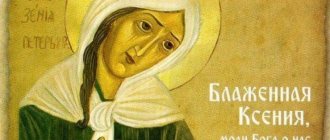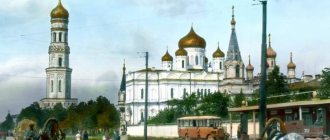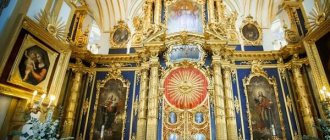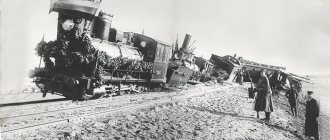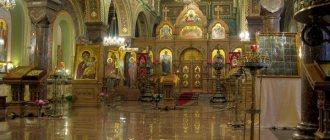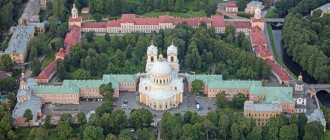Contents of the parable
One master called three slaves to his chambers and gave each of them a different number of silver coins. When dividing the coins, he proceeded from the abilities and real capabilities of each servant. He gave one man 5 coins, another two, and the third slave only one coin.
Parable of the Talents
Two men invested this money in the business and made a profit, but the third slave was afraid to spend his master’s money and buried the coin in the ground. After returning, the servants returned his money to the owner with a profit, for which he rewarded them. And the last servant, who failed to increase his money, was subject to the wrath of his master.
Important! Thus, the catchphrase “burying talent in the ground” means that a person has neglected some knowledge, opportunities or experience.
What does "talent" mean?
You will probably be surprised, but two thousand years ago this word meant something completely different from what we know now.
Talent (τάλαντον, “talanton”) – translated from Greek as “scales” or “weight”. This was the name of the measure of weight, which in ancient times was actively used in Ancient Egypt, Greece, Rome, Babylon, Persia and other countries. During the Roman Empire, a talent was equal to the volume of one amphora filled to the brim.
In addition to measuring weight, talent was also used as a unit of account in trade. Gradually it became the largest in the ancient world.
Theological interpretation
It is traditionally believed that this parable is about Christ and his followers - people who keep the Christian faith in their hearts. The Lord gives each person both external blessings and internal talents. Each person receives both special abilities and opportunities, as well as challenges that he can handle.
The separation of the servants from the master symbolizes that segment of earthly life that passes after the end of Christ’s earthly journey. Christians believe that the Son of God will return to Earth in His glory, and then the highest judgment will take place, at which every person will answer to the Almighty.
All people will be responsible for their actions. Those who have taken advantage of God's gifts and multiplied the blessings given by the Lord, grown spiritual shoots in their souls, will be awarded praise and God's mercy. Those who spent their time to no avail, without appreciating God’s mercy and blessings, will be punished.
Part 2
OK. 18:35–43 (93 credits).
There are many, too many things in the world that a person either does not use for their intended purpose or abuses them.
Many people wear watches on thick gold chains - let's start with this - not because of the watch, but because of the people: so that they can see what kind of jewelry they have!
Many keep sleek horses and magnificent carriages, not because they need to travel a lot, but to the surprise of the people and the envy of their enemies! Oh, a hundred times pitiful are those for whom dumb horses and dead wheels raise their authority!
Many dress indecently, not to hide their desperate nakedness and protect their bodies from cold and dust, but to emphasize their beauty. Oh, the unenviable beauty that dry grass and animal skin can so emphasize!
Many people clutter their home with gold and silver dishes and other unnecessary decorations, just enough to have something to protect from thieves to death. O poor brethren, do you not understand that you must beware of the most terrible of all thieves, who has completely plundered and devastated your soul? If you took care of your soul as you take care of your jewels, your soul would outlive them; and so your jewels will outlive your soul.
What can we say about food and drink, given by God to people to support the body and used by people to the destruction of both body and soul?
And what can we say about the language given to people so that they glorify God, teach and console each other, and which they use for blasphemy, boasting, slander, in order to embitter and poison souls?
And what can we say about reason, given to people so that they pave the way to Divine truth, and used by them as an accomplice and farm laborer of all kinds of sins and vices?
And one more thing: what can we say about the human heart, given to people to be an organ of love, an organ of contemplation of God and the spiritual world, and turned by them into wineskins of all uncleanness: lust, love of money, pride and hatred?
The same can be said about the eyes. God gave people vision for no other reason than so that, looking at this world, they would see an approximate image of that other, true and immortal world. But, just as if someone, staring at a shadow, would forget about the tree casting this shadow, so many sighted people throughout their lives rivet their eyes exclusively to this sensory world, completely blinded in soul to the vision of God and the heavenly world. Why then do they need their eyes? Do not their eyes then become the destroyers of their souls? Their eyes did not help them find the path to eternal truth, but led them away from the original good path, on which God places all young souls, into the impenetrable errors and thorns of this world, from where nothing is visible except these very errors and thorns. Oh, to how many not even thousands, but millions of human creatures the eyes have brought complete destruction of the soul! Can we count how many kings in history have lost their kingdoms because of the lust of the eyes? And how many sages are the mind? And how many decent men and women are honorable? How many wealthy houses have been ruined because of precious women's jewelry that is absolutely unnecessary for a blind man! How many hospitals are filled with those who first sinned with their eyes, and then paid for their sin with decay of the body and spiritual darkness! Truly, if it were possible to count all the victims of greedy and lustful eyes, it would be impossible not to exclaim: “One can envy the blind!”
That is why our Lord Jesus Christ never called a single physically blind person who approached Him blind, while he called the elders of the Jewish people, spiritual leaders and scribes blind, having eyes but not seeing anything (Matthew 13:15). For he who is blind with the eyes of the body is blind temporarily, in this world alone; and he who is blind in spirit is blind to both worlds, both this and the other, both in this time and in eternity. Bodily blindness is only a pale picture of spiritual blindness and a clear reminder to the spiritually blind, who see neither God nor the Kingdom of God, to come to their senses and be treated while there is still time. Through the bodily blind, God wants to reveal the blindness of the spiritual blind. The source of blindness of the eyes is not God, but, as in the case of all other defects and diseases, human sin. If there were no spiritual blindness in people, then all those blind with their bodily eyes would immediately receive their sight. But as long as there are spiritual blind people who do not see God in spirit, God will depict their blindness through the closed eyes of the physically blind.
If there were no spiritual deafness and dumbness in people, then all the deaf would immediately begin to hear, and the dumb would speak. But as long as there will be people who lack the hearing to hear the law of God, and the tongue to speak about the greatness and glory of God, God will use the physically deaf and dumb to express their spiritual deafness and dumbness.
If there were no spiritual leprosy, no consumption, no weakness, no fever, no other illnesses of the spirit, then all the physically ill would instantly be healed of all diseases that manifest themselves physically, since the sick spirit causes them to manifest themselves and depict its condition. And as long as all these diseases exist in the human spirit, they will all manifest themselves on human bodies.
So, the blindness of the bodily eyes has its deep spiritual meaning and finds its explanation only exclusively in spiritual science. One who is not versed in spiritual science does not know and cannot find out anywhere outside the field of this science why bodily blindness, deafness, dumbness and all other diseases and ailments of the human body exist in the world. Such a person, having met a blind man, can only open his mouth in surprise, feel pity and think: “Thank God I’m not blind!” Who told you that you are not blind? And why do you pity the one whom the mysterious Providence placed before you out of pity for yourself? If you were not blind in spirit, a blind man would not appear before you. But he appeared - as a living diagnosis of your illness, your inner blindness. If the blind man simply aroused your pity and you reached for your wallet and gave him alms, then neither you nor he have fulfilled their main task properly. The main task of a blind person when meeting you is to show your inner blindness with his external blindness; and your main task in this case is to come to your senses with this object lesson, cry over your own blindness and rush with all your might to be cured of the blindness of the spirit.
Where should you hurry? Who should I hurry to? Who in the world is a doctor for the blind? None of the mortal people. Only He who created spiritual and physical vision, only He alone is able to heal from both spiritual and physical blindness.
But why, you ask, did our Lord Jesus Christ, having the power to heal the blind, not cure all the blind on earth? How would the spiritual blindness of people be revealed then? What benefit would books written about spiritual blindness bring if people have difficulty coming to their senses, even when they see living blind people in front of them? As long as there is spiritual blindness, there will be physical blindness.
Now let’s look at today’s Gospel reading and see from it why our Lord Jesus Christ healed precisely those blind people whom He healed, and only them.
During this time, when He approached Jericho, a blind man was sitting by the road, begging for alms. Our Lord Jesus Christ traveled in this case from Galilee to Jerusalem and went along the Jordan Valley, the shortest route, through the city of Jericho. This is His last visit to this city. The first, of course, happened about three years earlier, when the Lord went out with the rest of the people to the Jordan to receive baptism from John the Baptist. What a difference between the first and last visit! Then the Lord walked, unrecognized, in a crowd of people; and no one in this crowd, inspired by John, noticed Him, the Mighty John, until John himself pointed to Him, proclaiming: “Behold the Lamb of God” and: “This is” (John 1:29-30). And now He walked “with His disciples and a multitude of people” (Mark 10:46) who followed Him, and with loud glory that reached even the blind men of Jericho. Then he was just beginning His Divine mission, and now he was approaching its bloody and victorious end.
Everything in the life of Christ happened as if by chance, but in fact, everything down to the smallest detail developed according to God’s plan, drawn up for the salvation of people. One blind man was sitting by the road. As if by accident! And as if by chance, Christ passed by him on the way. In reality, all this was according to God’s Providence. The Lord had to open the physical eyes of this wretched blind man just a few days before the spiritual blind crucified Himself on the cross in Jerusalem. He wanted to use the faith of this blind man to disgrace the unbelief of the Jerusalem elders and scribes. And I wanted to clearly show once again that everything in this world has been turned inside out by human sin, so that those who do not see see, but those who see are blind. Just as He Himself said earlier that He came “into this world so that those who do not see would see, and those who see would become blind” (John 9:39). Those who looked at the Holy Scriptures with their eyes every day in the temple and interpreted them to the people, could not see the Messiah and Savior in the Lord Jesus; and this blind man of Jericho, who could neither read the Holy Scriptures, much less interpret it, saw in Christ the Lord and Savior of the world. From the Gospel of Mark it is known that this blind man was the son of a certain Timaeus, which is why he was called Bartimaeus. The Evangelist Matthew mentions not one blind man, but two. The evangelists do not contradict each other at all on this, but, as in the case of the two demoniacs in Gadara, one evangelist mentions two, while the other singles out only one, who was more important and more famous in the surrounding area. These two blind men might not even be together, but one at one end of the city, and the other at the other. For it often happened that the Lord performed many miracles in one and the same place and healed many sick people on the same day. But here we are talking about one, the one who was more famous in the city - about Bartimaeus.
This blind man was not only blind, but also a beggar, for it is said: he sat by the road, begging for alms. Begging is the profession of most blind people in the world. Can anyone fail to see the finger of God in the fact that the majority of the world's poor are blind? A blind man, since he cannot see himself, must inevitably try to have as many people as possible see him. So it serves people as a living reminder of another world. A rich blind man who is within his own four walls is doubly blind, for he does not see and is not seen and, thus, he remains useless both for himself and for others. The blind poor man is forced to be among people, begging for alms.
So Bartimaeus sat, as usual, by the dusty road and asked for alms from those passing by.
And, hearing that people were passing by, he asked: what is this? A huge crowd of people was hurrying after Christ at that time. Bartimaeus heard the noise of this crowd with his heightened hearing, which, as is known, is enhanced by blindness. They told him that Jesus of Nazareth was coming. Then he shouted: Jesus, Son of David! have mercy on me. Blind Bartimaeus only had to hear this great name to immediately scream loudly. This means that he already knew our Lord Jesus Christ not only by His name, but also by His deeds. He must have learned that many of his fellow sufferers, the blind, had been healed by Christ. Therefore, probably, he had long dreamed that this only Healer would walk along the road along which he spent his days, blind as the dust in which he sat, having no hope in this life except Christ - or except death. And because Bartimaeus dreamed of meeting Christ for so long and expected it, there was already a ready exclamation on his lips: Jesus, Son of David! have mercy on me. Why does he call Him the Son of David? Because the promised Messiah had to come from the line of David, as it happened, for the Blessed Virgin Mary was from this line. Have mercy on me. That is: give me what You alone can give me. Have mercy on dust within dust! Little people hardly give me pennies so that I can nourish my body with bread. You can give me everything I want. And I want only one thing: to see the light. I believe in Your mercy; I believe that you will give me sight more easily and willingly than people give me pennies. For You are royally rich in gifts and mercy. Jesus, have mercy on me!
Those walking in front forced him to remain silent; but he shouted even louder: Son of David! have mercy on me. There were so many people that some hurried before Christ, while others ran after Him. Bartimaeus probably screamed at the top of his voice, since they began to stop him and even force him to remain silent. Probably his desperate voice drowned out all the noise and din of the huge mass of people. Probably many people were tired of his screams, since they were forced to silence him. But Bartimaeus did not remain silent. He knew that the fateful hour had struck for him: either he would be healed by Christ the wonderworker, or he would remain by the road until his death, surrounded by lifelong night. Therefore, he does not pay the slightest attention when those who, even with the greatest mercy, cannot give him anything except small coins, force him to remain silent; but continues to cry out to the One who can give him what only God gives. Jesus, have mercy on me!
Unfortunately, similar scenes are repeated countless times today. Many, many who want to draw closer to our Lord Jesus Christ are prevented from doing so, and it is usually the people who go ahead who hinder them: the elders of the people, spiritual leaders and scribes. Many thirsty souls crying out to Christ are ridiculed and silenced. And usually the simple and poor, whose hearts are not so hardened by malice and vice, try to get closer to Christ and cry out to Him, while those who have lost the way and wandered into the thorns of this world keep them silent and push them away from the Lord. And what happens to individuals also happens to entire nations. The simple masses of the people throughout Europe, for example, today cry out to Christ as the only visionary Guide and Savior, while the leaders of the European nations mock them, force them to remain silent, and in some places even forbid the people to pronounce this holy and saving name . Thus those who then went ahead and silenced blind Bartimaeus were more blind than he; how, for the most part, the elders of European nations, their scribes and so-called popular educators are more blind than ordinary European peasants. So today, as in those days, the words of Christ are fulfilled: those who do not see see, but those who see have become blind.
But look what a marvelous example of firmness and constancy in faith blind Bartimaeus sets for us all! He is forced to remain silent, but he does not pay attention to it. They force him, but he screams louder. Why pay attention to dry reeds that are as blind from the inside as they are from the outside? His thirsty soul feels a stream of fresh and perfect life flowing through Christ; feels that this Jesus, about whom he has heard and pondered so much, carries Heaven on his head, wisdom on his tongue, mercy in his heart and health in his hands. What, next to this Life-Giver Jesus, are all the high priests, Pharisees and scribes, only bragging about worldly knowledge and arguing about books and ideas? Dry reeds rustling in vain; dead bones creaking as they rub against each other! With all their knowledge, and wisdom, and power, and vanity, they cannot give him, a desperate blind man, anything but dirty and dubiously obtained pennies. These are the ones who now shake their fists at him and force him to remain silent, now that the true Sage, the true Lover of Humanity and the true Doctor deigns to touch with His holy feet the dust of the road settling on the rotten pits that were once the eyes of Bartimaeus. Should he listen to them at this fateful hour? Should he be afraid of the noise of dry reeds and the sound of dead bones? No, no way, Bartimaeus! It is better for you to give up the ghost under their blows than to remain sitting by the road, depending on their pennies. No, no way, O Christian! And do not be afraid of those who stand between you and Christ, even if they wear royal crowns on their heads, iron rods in their hands and all the knowledge of this world in their heads. For in comparison with Christ they are all dry reeds and dead bones. They themselves do not see and cannot give you sight; they do not have life in themselves and cannot give it to you; they themselves know nothing and cannot teach you anything. All their earthly strength, and wealth, and wisdom are small coins, which they, like beggars, beg from this visible world and, if you ask the beggars, they will give it to you. O Christian, be constant in your cry to Christ, like blind Bartimaeus! Scream, scream louder until He hears you. Let yourself be silenced; let the spiritual blind mock you; let the dry reeds rustle; let the dead bones creak - just shout tirelessly: “Jesus, have mercy on me!”
This blind Bartimaeus was truly not blind in spirit. His strong and irresistible faith in our Lord Jesus Christ gave sight to his spirit. He looked and saw God in spirit, although he could not see God’s creation with his physical eyes. He looked and saw the main thing, powerful, enduring, immortal, incorruptible, eternally alive and joyful. The real and incurable blind people forced him to remain silent. In vain they fled before Christ, like His vanguard; they were more blind than Bartimaeus, for they did not know before Whom they were running and Who was following them. What a terrible and majestic lesson for modern priests, for those who go ahead and lead the spiritual life of the people! Let them shut themselves up in the cage of their souls and think for themselves whether they see more clearly than this blind Bartimaeus, who could not see with his eyes either trees, stones, animals, or bushes, but with his spirit he saw God, looked and saw the Divinity of our Lord Jesus Christ ? Are not some of them in many ways similar to those who went ahead when they oppress true believers; when they laugh at human souls crying out to the Living Christ; when they fight with ardent pilgrims, forcing them to remain silent?
Finally, our Lord Jesus Christ approached, heard the cries of blind Bartimaeus and saw those who forced him to remain silent. Jesus stopped and ordered him to be brought to Himself. Thousands of people passed by the unfortunate blind man, and none of them stopped, did not take pity, but, moreover, they ordered him to be silent so that he would not offend their hearing. And Jesus saw him and stopped. And how could He not stop in front of the blind man? After all, this is a man, and Christ came into the world for the sake of people. How can one not stop in front of a person who is screaming, begging Him for help, in front of a kind person with a vigilant soul? Why should He rush to Jerusalem? There are Herod, Pilate and Caiaphas, people worse and more blind than this Bartimaeus. This one asks Him for salvation, and they prepare a cross for Him. He stopped and ordered the merciless people running ahead to stop and take pity on one of their brothers. Oh, if even today the Lord would tell all those progressive people who are chasing so-called progress and inevitably leaving their poor brothers to cry and scream in vain in a muddy puddle by their progressive road - if only He would tell them to stop! Look, man is more important to Him than all human progress, external and false, all civilizations, universities, books, machines. Grace is more important than all human phrases, all human creations, mental and material. Those who run ahead are guided by small values, but Christ is always guided by the greatest. Those who run ahead are petty traders, collecting and dividing pennies, but Christ is the true rich man, carrying with Him the greatest treasures and generously distributing them.
Evangelist Mark reports that, after Christ’s command to bring the blind man to Him, people approached Bartimaeus and called him, saying: do not be afraid, get up, he is calling you. He took off his outer garment, stood up and came to Jesus. From this it is clear that before this Bartimaeus shouted while sitting, and shouted very loudly so that Christ could hear him. It seems that he could not get up until he was called, from great excitement and fear, lest Christ pass by without hearing him. And now, filled with joy when they told him that He was calling him, he jumped up, threw off his outer clothing and came.
These words hide a deep inner meaning, or rather, they hide the entire course of salvation of our soul. In our spiritual blindness, we too sit in the dust of this world. Having felt the presence of God, we at the same time most painfully feel our blindness by sin, our weakness, uncleanness, insignificance. Then, with tears, we begin to cry out to God for help, but still sitting, for we cannot rise from the mire of sin, no matter how much we hate sin, until we feel that God has heard our cry and heeded it. Don't be afraid, get up, it's calling you. The awakened sinner needs to hear these words before he rises out of sin and approaches God decisively. For, having sensed the closeness of God and his sinful blindness, a person is overwhelmed by the indescribable fear of God’s Judgment. He sits as if paralyzed, trembling with fear and crying out to God, asking for help. It is necessary that first someone tell him not to be afraid, then tell him to rise from the mud of his weakness and sinfulness, and then only that God is calling him. Who will say this to an awakened sinner? Church. It was founded for this purpose, to encourage awakened sinners, to help them stand up and to assure them of God’s mercy. This is why it exists so that everyone who calls on God for salvation can answer: don’t be afraid, get up, he’s calling you. But why did Bartimaeus take off his outer clothing before standing up and coming to Christ? And here lies its deep inner meaning. By clothing is meant the fabric of sin and vice in which the soul of a blinded sinner is clothed. Because of this garment of sin, his soul is blind, and that is why it does not see God; Because of this lead-heavy clothing, he can neither get up nor come to God. So, he must throw off this unclean, heavy and opaque garment from his soul - that is, he must first remove all sin from himself - so that only then can he stand up and come to God.
Trembling all over, like a string on a harp, blind Bartimaeus approached our Lord Jesus Christ.
And when he approached Him, he asked him: What do you want from Me? He said: Lord! so that I can see the light. Why does Christ ask the blind man what he wants from Him, if he knows it in advance? In fact, He knows in advance not only what the blind man wants from Him, but also, even before arriving in Jericho, He knows everything that will happen that day in Jericho. He, who forty years predicted the destruction of Jerusalem and the resettlement of the Jews throughout the world, He, who foresaw the end of the world and the Last Judgment several thousand years before this would happen, could easily have foreseen what would happen on this day in Jericho, and thus more than what blind Bartimaeus expects from Him. Thus, He asks, not because He does not know, but He asks for the sake of blind Bartimaeus himself and for the sake of the people present. He asks for the sake of Bartimaeus, so that he clearly expresses his desire and, with the help of words, reveals the feelings of his heart. By this, the Lord teaches us all that we need to give a clear form to all our prayers to God. Prayer expressed in words crystallizes, purifies and strengthens the prayer of our heart. And for the sake of the people, the Lord asks, so that all the people can hear what the blind man asks of Him. Namely, so that everyone can hear that blind Bartimaeus does not ask Him for alms in the form of pennies, but asks for alms that mortal people are not able to give him and which only the One Living God gives. For until that time, Bartimaeus had not clearly expressed what he really wanted from Christ, although he clearly felt in his heart and understood with his mind what he needed. Until that time, he only shouted: have mercy on me. But he shouted the same thing to other people, from whom he expected financial alms. He could shout to everyone passing by: “Have mercy on me!” That is why the Lord wants the blind man to express clearly and in front of everyone what kind of mercy he desires from Christ.
God! so that I can see the light. With these words Bartimaeus answers Christ’s question. So that I can see the light. Please note that, having approached Christ, Bartimaeus no longer calls Him either Jesus or the Son of David, but Lord. This means that having already approached Christ, he realized that Jesus is Lord. This happens with all believers: from afar, Christ looks to them simply as a Man, albeit a great one. From afar we call Him by a human name and talk about His earthly origin. But when we draw closer to Him, when we feel His powerful and life-giving breath, only then will we know His heavenly origin, we will know that He is not of this world, that He came from eternity to visit those traveling through time - and that He is truly Lord.
God! so that I can see clearly,” blind Bartimaeus tells him with a trembling tongue. Jesus said to him: see! your faith has saved you. And he immediately received his sight and followed Him, praising God. Only one powerful word: “See!” - and blind Bartimaeus received his sight. This is not any kind of suggestion, which the bewitching spirits of our time talk so much about. But this is the omnipotent word of God, which, by naming, immediately creates. Just like at the beginning of creation, when God said: let there be light. And there was light. The fox uses suggestion when communicating with chickens, not God when communicating with people. For if the spiritual blind, who are displeased with the omnipotence of God and His closeness to people, explain this miracle by suggestion, then it is necessary to explain by suggestion how, according to the word of Christ, the fig tree withered, and the storm at sea subsided, and the wind stopped. But can it even occur to anyone that by means of suggestion he could instantly dry up a tree or calm down the lifeless elements such as the sea and the wind? Who and when influenced trees, winds and storms by suggestion?
Your faith saved you. Our Lord Jesus Christ pronounces these words to teach people meekness and humility. This is what He often said to those healed of terrible illnesses. So He said to the bleeding woman, who suffered from the flow of blood and was healed by one touch of His clothes: “Be of good cheer, daughter! your faith has saved you” (Matthew 9:22). But what kind of faith could help so many demon-possessed madmen whom the Lord healed? What kind of faith helped the resurrection of the son of the widow from Nain, if the Lord raised the young man suddenly, when no one asked for it or expected it? And did the Lord raise Lazarus according to the faith of Martha and Mary, and not in spite of their doubts? The work of blind Bartimaeus’s sight, thus, is a work of the power of Christ, but the Lord wants to attribute it to Bartimaeus’s faith, in order to teach us humility and meekness, in order to erase the head of the satanic pride of people who, having given the blind man a penny, are so proud in their hearts, as if they had created something great. In the spirit of Christ’s meekness, the Apostle Paul also says: “Do nothing out of selfish ambition or conceit, but in humility of mind consider each other better than yourselves” (Phil. 2:3). Having spoken these words to Bartimaeus, the Lord thereby wants to honor human dignity; wants to show that people are called to be co-workers with God in all good things. If, people, you want to know what your collaboration with God consists of, then know: it is in faith in our Lord Jesus Christ. This is the only thing that is required of you and the only thing that you can do. Believe, and God will fulfill what you want according to your faith.
And Bartimaeus immediately received his sight and followed Him, praising God. As soon as Bartimaeus opened his eyes and received his sight, he saw our Lord Jesus Christ before him. Blessed is he: as soon as he opened his eyes, he saw the most worthy contemplation! And he could not take his eyes off Him, from His beauty and sublimity, but, as if chained, he followed Him. And really, what else was worth looking at? To dirty Jericho, the dark place of your torment? Or on the grass that will wither? Or on the clouds that will dissipate? Or cattle awaiting slaughter? Or at people irrevocably hastening towards the grave and incorruption? Or for this entire deceptive world, awaiting its end and grave, a world born in pain, living in pain, and dying in pain? No; Bartimaeus fixed his gaze on the immortal Jesus, the One who is stronger than the whole world, stronger than death and stronger than all the powers of hell, and his gaze remained riveted on Him. Everything in the world that the eye can see should serve as a road sign for man, pointing him in the direction of the sweetest vision, the vision of God. Otherwise, all this serves as a pointer to a person towards confusion, thorns, spiritual darkness and final destruction. Bartimaeus, having received his sight, saw God without the mediation of nature, and he had neither the desire nor the need to look at anything else. Why look death in the face when he has seen the Imperishable? Why look at the transitory when he has approached the Ever-Substantial? Why cling to the powerless things of this world when he clings to the Almighty? And he followed Him, praising God. Now his eyes rule his tongue, his feet, and his whole body, and his whole soul. Seeing Christ the Living, he now knows what his tongue is for: to glorify God. And he begins to praise and thank God. Thus, Bartimaeus used his eyes not for evil, not for depravity and destruction of himself, but for the purpose for which God gave eyes to man: to contemplate the greatness and glory of God. And all the multitude of people who were here, seeing this glorious miracle, thanked God. The gift given by our Lord Jesus Christ to Bartimaeus quickly spread to many others, so that many doubters and unbelievers, blinded by doubts and unbelief, opened their spiritual eyes and began to praise God.
All this, which happened to blind Bartimaeus, continues to this day with many spiritually blind people when spiritual sight returns to them. Then they follow Christ and do not want to see anything else. Then they praise God and do not want to praise anything else.
Oh, what a huge hospital this world is! And the largest number of patients in this hospital are blind. And the only Doctor in this hospital is our Lord Jesus Christ. Oh, how dusty is the Jericho road of this world, and what a gloomy crowd is hurrying along this road! And the only one who can grant sight to all the blind goes after these people. This is our Lord Jesus Christ. And one bodily blind man, Bartimaeus, stood at that time among the crowd of spiritual blind people. This ratio remains true to this day. And today the number of bodily blind people is unusually small compared to the huge number of spiritual blind people, for whom bodily blindness serve only as a living reminder, a living image and a living diagnosis. But the more the number of spiritually blind people increases, the more the number of physically blind people increases. European culture can hide all the body-blind people in hospitals, but it cannot reduce their number. She can shut them up within four walls so that the world does not see them, but so much the worse for the world! In this case, countless spiritually blind people will no longer be able to see the picture of their soul on the corners of city streets and at the crossroads of village roads and read the diagnosis of their spiritual illness.
Coming from Jericho to Jerusalem, our Lord Jesus Christ was killed by spiritual blind men, Herod, Pilate, Caiaphas and a blind crowd of elders and scribes. But the coffin barely held Him for three days - and was forced to release Him. He commanded the earth to release Him from the tomb, just as He commanded blindness to leave the eyes of Bartimaeus. And His tomb became a bright eye for the whole world. The Lord has risen, and, Alive, walks even now - invisible to the physical, but visible to spiritual human eyes - along the dusty road of this world, waiting for some blind man to cry out to him for help: Lord Jesus, have mercy on me! He is ready to have mercy on anyone - you just have to appeal to Him - just as He had mercy on Bartimaeus. And everyone who has received spiritual sight from Him will follow Him and glorify God. Honor and glory to our Lord and Savior Jesus Christ, with the Father and the Holy Spirit - the Trinity, Consubstantial and Indivisible, now and ever, at all times and forever. Amen.
Interpretation of John of Kronstadt
John of Kronstadt in his interpretation emphasized that different people received different numbers of coins from God. In his understanding, coins represent the mental strength and inner abilities of a person. With effort and righteous life, a person increases these qualities.
The servant buried the coin in the ground for fear of losing it
The more abilities and strengths a person has been given from above, the more strictly the Lord will ask him, the more this person must do good to his neighbors. An ordinary person is required to be conscientious, honest, responsible, and merciful.
A rich person should be generous, disdain cunning and meanness, earn his money by work, and not by deception. A priest must be sensitive to his parishioners, sincerely believe in his ideals and try to ignite a spark of this faith in the hearts of other people.
Important! A person who buried goods in the ground symbolizes an idle, lazy person who does not want to work for the salvation of his soul.
Interpretation of Saint Luke
Luka Voino-Yasenetsky said that talent buried in the ground symbolizes the lost ability to love. Love is above all earthly blessings, and it is this gift that we should develop most of all. At the end of our earthly journey, we must offer our love as a gift to the Almighty, doubling and tripling it.
To do this, we must not forget about the sacrifice that the Son of God made for us. Love also increases our mercy, patience, and care for our neighbors. The fate of a person who does not take advantage of the gift from above, who has lost this divine ability, is unenviable. Such a person will be lost to eternal life.
The parable of the talents is a kind of warning about the Last Judgment
